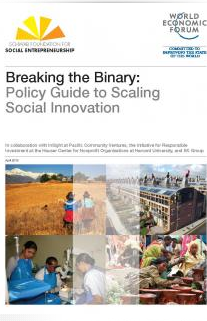
The Schwab Foundation for Social Entrepreneurship has released a report, Breaking the Binary: Policy Guide to Scaling Social Innovation (April 2013).
They define social innovation as, “the application of innovative, practical, sustainable, business-like approaches that achieve positive social and/or environmental change, with an emphasis on low-income or underserved populations.”
The second part profiles “leading social enterprises in the Schwab Foundation network working in specific domains: education, health, employment, urban development and rural development. In profiling proven social innovation models, our aim is to showcase the realities of social enterprises, bring the abstract concepts of “social entrepreneurship” and “social innovation” to life, and inspire the next generation of social entrepreneurs to build off of these models and apply them to different problems or cultural contexts.”
They include a Framework for Government Action and provide case studies illustrating each part of the framework:
On pp. 43-45 they outline Social Benefit Bonds in Australia as part of the Review and Refine Policy section – focusing on the importance of refining policy to be contextually appropriate.
“We can no longer count on governments alone to provide all of the services a person needs to thrive. We probably never could. Nor can we leave it to the markets alone. This next chapter in history must start with a commitment to justice for all of the world’s people and be spurred on by our collective courage to innovate and experiment with new models that don’t sit neatly within government or market forces alone.We have it within our grasp to identify, support and grow solutions where markets have failed and governments alone have fallen short. What it requires of us is moral leadership and the recognition of fundamental human values of dignity, choice and opportunity. Our interconnected world demands leaders who take risks and look for pragmatic, not ideological solutions, and see investment as a means, not an end. Fundamentally, this is about whether our generation can use the tools, skills and technologies available to us, and create a global society where all individuals have the chance to flourish and contribute.”
Jacqueline Novogratz, Founder and CEO, Acumen Fund; member of the Global Agenda Council on Social Innovation
Find the report here.

